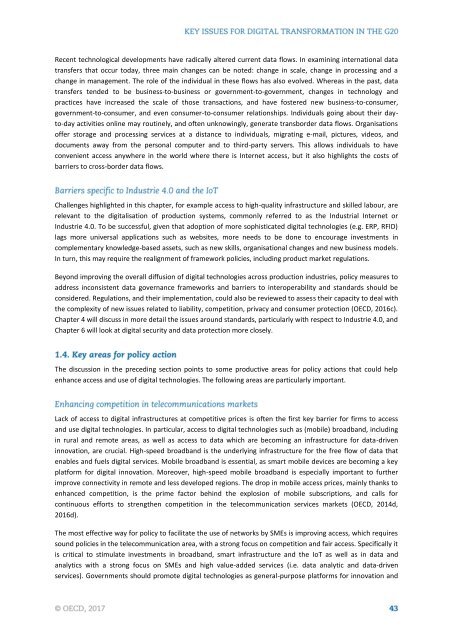KEY ISSUES FOR DIGITAL TRANSFORMATION IN THE G20
2jz0oUm
2jz0oUm
Create successful ePaper yourself
Turn your PDF publications into a flip-book with our unique Google optimized e-Paper software.
Recent technological developments have radically altered current data flows. In examining international data<br />
transfers that occur today, three main changes can be noted: change in scale, change in processing and a<br />
change in management. The role of the individual in these flows has also evolved. Whereas in the past, data<br />
transfers tended to be business-to-business or government-to-government, changes in technology and<br />
practices have increased the scale of those transactions, and have fostered new business-to-consumer,<br />
government-to-consumer, and even consumer-to-consumer relationships. Individuals going about their dayto-day<br />
activities online may routinely, and often unknowingly, generate transborder data flows. Organisations<br />
offer storage and processing services at a distance to individuals, migrating e-mail, pictures, videos, and<br />
documents away from the personal computer and to third-party servers. This allows individuals to have<br />
convenient access anywhere in the world where there is Internet access, but it also highlights the costs of<br />
barriers to cross-border data flows.<br />
Challenges highlighted in this chapter, for example access to high-quality infrastructure and skilled labour, are<br />
relevant to the digitalisation of production systems, commonly referred to as the Industrial Internet or<br />
Industrie 4.0. To be successful, given that adoption of more sophisticated digital technologies (e.g. ERP, RFID)<br />
lags more universal applications such as websites, more needs to be done to encourage investments in<br />
complementary knowledge-based assets, such as new skills, organisational changes and new business models.<br />
In turn, this may require the realignment of framework policies, including product market regulations.<br />
Beyond improving the overall diffusion of digital technologies across production industries, policy measures to<br />
address inconsistent data governance frameworks and barriers to interoperability and standards should be<br />
considered. Regulations, and their implementation, could also be reviewed to assess their capacity to deal with<br />
the complexity of new issues related to liability, competition, privacy and consumer protection (OECD, 2016c).<br />
Chapter 4 will discuss in more detail the issues around standards, particularly with respect to Industrie 4.0, and<br />
Chapter 6 will look at digital security and data protection more closely.<br />
The discussion in the preceding section points to some productive areas for policy actions that could help<br />
enhance access and use of digital technologies. The following areas are particularly important.<br />
Lack of access to digital infrastructures at competitive prices is often the first key barrier for firms to access<br />
and use digital technologies. In particular, access to digital technologies such as (mobile) broadband, including<br />
in rural and remote areas, as well as access to data which are becoming an infrastructure for data-driven<br />
innovation, are crucial. High-speed broadband is the underlying infrastructure for the free flow of data that<br />
enables and fuels digital services. Mobile broadband is essential, as smart mobile devices are becoming a key<br />
platform for digital innovation. Moreover, high-speed mobile broadband is especially important to further<br />
improve connectivity in remote and less developed regions. The drop in mobile access prices, mainly thanks to<br />
enhanced competition, is the prime factor behind the explosion of mobile subscriptions, and calls for<br />
continuous efforts to strengthen competition in the telecommunication services markets (OECD, 2014d,<br />
2016d).<br />
The most effective way for policy to facilitate the use of networks by SMEs is improving access, which requires<br />
sound policies in the telecommunication area, with a strong focus on competition and fair access. Specifically it<br />
is critical to stimulate investments in broadband, smart infrastructure and the IoT as well as in data and<br />
analytics with a strong focus on SMEs and high value-added services (i.e. data analytic and data-driven<br />
services). Governments should promote digital technologies as general-purpose platforms for innovation and


